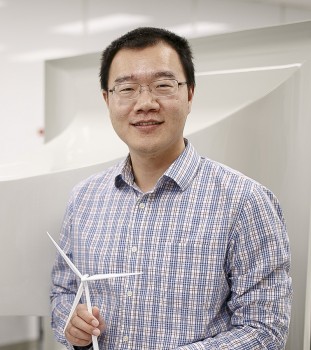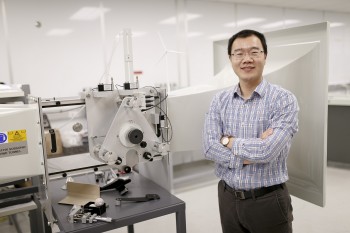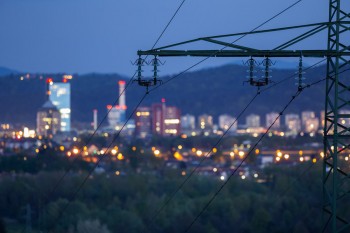Ph.D. - Mechanical Engineering
Rensselaer Polytechnic Institute - 2012
Professional Preparation
M.S. - Mechanical Engineering
Huazhong University of Science & Technology - 2008
Huazhong University of Science & Technology - 2008
B.S. - Mechanical Engineering
Huazhong University of Science & Technology - 2006
Huazhong University of Science & Technology - 2006
Research Areas
Research Interests
Dr. Zhang's research interests and expertise are: power & energy systems, sustainable energy (such as wind energy, solar energy, small modular reactor, microreactor), machine learning, complex engineered systems, and multidisciplinary design optimization.Publications
Li, H., Shen, G., Senemmar, S., Mehmani, A. and Zhang, J., Real-time Greenhouse Gas Emission Intensity Informed Demand-Side Load Regulation for Power Grid Decarbonization, Cell Reports Sustainability, Vol. 2, Issue 5, 2025, pp. 100367. 2025 - Publication
Rahman, J. and Zhang, J., Steady-state Modeling of Small Modular Reactors for Multi-timescale Power System Operations with Temporally Coupled Sub-models, IEEE Transactions on Power Systems, Vol. 40, Issue 1, 2025, pp. 793-805. 2025 - Publication
Jacob, R. A., Paul, S., Chowdhury, S., Gel, Y. R. and Zhang, J., Real-Time Outage Management in Active Distribution Networks Using Reinforcement Learning over Graphs, Nature Communications, Vol. 15, 2024, pp. 4766. (Featured Article) 2024 - Publication
Awards
Outstanding Associate Editor - Journal of Mechanical Design [2025]
Faculty Research Award - UTD [2025]
FRIEND of Research and Innovation - UTD [2025]
Invited Participant - U.S.-Africa Frontiers of Science, Engineering, and Medicine Symposium [2024]
Fulbright U.S. Scholar award - Fulbright [2024]
Young Investigator Award - Office of Naval Research [2020]
Young Investigator Award - ASME Design Automation Committee [2020]
Appointments
Professor
University of Texas at Dallas [2025–Present]
University of Texas at Dallas [2025–Present]
Associate Professor
University of Texas at Dallas [2021–2025]
University of Texas at Dallas [2021–2025]
Assistant Professor
University of Texas at Dallas [2015–2021]
University of Texas at Dallas [2015–2021]
Research Engineer
National Renewable Energy Laboratory [2014–2015]
National Renewable Energy Laboratory [2014–2015]
Postdoctoral Researcher
National Renewable Energy Laboratory [2012–2014]
National Renewable Energy Laboratory [2012–2014]
Additional Information
Major Honors and Awards
News Articles
Engineers Recognized for Work to Improve Business Forecasting Practices
 Two researchers from the Department of Mechanical Engineering in the Erik Jonsson School of Engineering and Computer Science have received the 2017-2018 SAS-IIF Research Award from the International Institute of Forecasters (IIF).
Two researchers from the Department of Mechanical Engineering in the Erik Jonsson School of Engineering and Computer Science have received the 2017-2018 SAS-IIF Research Award from the International Institute of Forecasters (IIF).IIF is a nonprofit organization dedicated to developing and furthering the generation, distribution and use of knowledge on forecasting. Every year, IIF provides two awards on forecasting, one each in business applications and methodology.
Mechanical Engineering Group Wins Best Paper Award
 A team of researchers in the Erik Jonsson School of Engineering and Computer Science recently won best paper award at the IEEE Green Technologies Conference.
A team of researchers in the Erik Jonsson School of Engineering and Computer Science recently won best paper award at the IEEE Green Technologies Conference.The Conference aimed to address securing green and clean energy sources to protect the environment and help build a more resilient power grid. The theme of this year’s conference was “smart cities,” which looked to increase efficiency and improve quality of life by creating systems that reduce costs and improve services.
Mechanical Engineer Garners Best Paper Award
Dr. Jie Zhang, assistant professor of mechanical engineering in the Erik Jonsson School of Engineering and Computer Science, received a best paper award at the 2017 IEEE Power & Energy Society General Meeting, held last month in Chicago.Zhang attended the conference with graduate student Cong Feng, the lead author of “Short-term Global Horizontal Irradiance Forecasting Based on Sky Imaging and Pattern Recognition,” which was chosen in the category for Power System Planning, Operation, and Electricity Markets. Research associate Mingjian Cui and mechanical engineering senior Meredith Lee were also co-authors of the paper, which concerned improving short-term solar power forecasting for power system operations
Researchers Work to Improve Business Forecasting Practices
A pair of researchers from the Department of Mechanical Engineering in the Erik Jonsson School of Engineering and Computer Science have received the 2017-2018 SAS-IIF Research Award from the International Institute of Forecasters (IIF).IIF is a non-profit organization dedicated to developing and furthering the generation, distribution, and use of knowledge on forecasting. Every year, IIF provides two awards on forecasting in Business Applications and Methodology.
Engineer Investigates Use of Navy Ships for Emergency Power
 Disasters such as hurricanes and tropical storms can leave millions of coastal residents and businesses without electricity for days or weeks. But a University of Texas at Dallas engineer is working to create large-scale mobile marine microgrids aboard U.S. Navy ships that could deliver temporary power during emergencies.
Disasters such as hurricanes and tropical storms can leave millions of coastal residents and businesses without electricity for days or weeks. But a University of Texas at Dallas engineer is working to create large-scale mobile marine microgrids aboard U.S. Navy ships that could deliver temporary power during emergencies.That’s the goal of a new project by Dr. Jie Zhang, assistant professor of mechanical engineering. Zhang received a 2020 Young Investigator Award from the Office of Naval Research to develop technology to make it possible for Navy ships to serve as mobile power providers after outages from natural disasters or cyberattacks. He said the ships could serve disaster-struck areas in the same way that Navy hospital ships have provided care to relieve overburdened hospitals in areas affected by the COVID-19 pandemic.
“Resiliency of the power grid is an urgent issue,” said Zhang, who directs the UT Dallas Design and Optimization of Energy Systems Laboratory in the Erik Jonsson School of Engineering and Computer Science. “We are trying to create a large-scale mobile energy facility that can make the power system more resilient, more reliable.”
